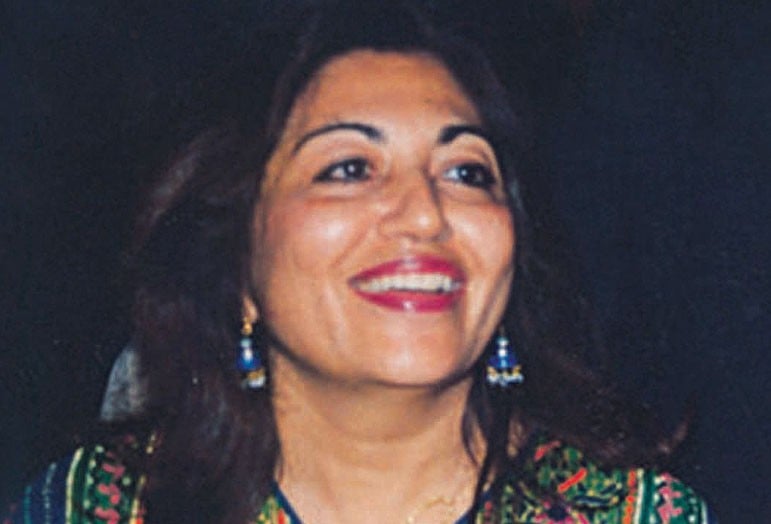
How should the profession commemorate her journalistic vision?

Dear All,
December 31 is a rather sad sort of a date for me. Not because it’s the last day of the year and there’s a sense of an ending as one looks back at another measure of time completed, or muses over deaths and disasters or missed opportunities, but because it is also the birthday of a great journalist, editor and friend Razia Bhatti.
Razia died suddenly almost 22 years ago in March 1996. It was a shock for all of us but also a great loss to journalism in Pakistan. She was an amazingly brave editor whose motto seemed to have been always: excellence in journalism.
This is the third column I am writing about Razia in two decades and every single time, I am reminded of her work and awed by her vision and dedication. Every journalist has at least one editor in their life who they cite as a major influence, somebody who inspired and guided them. Razia did that for many of us but she did a lot more than just mentoring -- she raised the bar in this profession, set high standards, and practised a genre of journalism in which public interest, independent, fact-based, unbiased writing were fundamental principles.
Fellow students remember her dedication and hard work from her student days at the Karachi University, and this commitment continued through her career with the Dawn group or PHPL. It was there that she oversaw the makeover of Herald magazine (a monthly that was formerly The Illustrated Weekly of Pakistan), and turned it into a serious and hard-hitting yet stylish publication. The magazine’s political reporting was incisive and intelligent, analytical and informative. Every last detail -- the headings and captions, the choice of pictures and illustrations -- was distinctive: succinct and witty. Along with the late Imran Mir’s creative team Razia and her team made the template for what the Herald is today (Part of this team were the late Ameneh Azam Ali, Talat Aslam, Rehana Hakim, Samina Ibrahim, Zahid Hussain and Sairah Irshad, to name just a few).
But in 1988 the PHPL management asked Razia to leave. Not because the magazine wasn’t doing well but because it was ruffling feathers in the Zia regime (in the post-Junejo dismissal period especially), and the management had other applications relating to its business that it needed the government to approve. She had once been reprimanded for doing a cover story centering around one victim’s harrowing account of being abducted, kept in a begaar camp (where the limbs of some abductees were amputated) and forced onto the streets to beg or steal. The story exposed the working of how powerful criminal networks were running this enterprise and laid bare the suffering and anguish of a child victim, yet the government of the day (General Zia himself apparently) commented that it was an ‘un- nationalistic’ piece of journalism as it painted Pakistan in a bad light.
And then in 1988, a Herald cover was stopped by management from publication. Elections had been announced and this was the cover story with the magazine cover depicting profiles of General Zia-ul Haq and Benazir Bhutto facing each other with words ‘Countdown to Confrontation’ across the top. Management insisted that they ‘could not put Benazir on the cover’ and so at the very last minute we had to replace it with a bland cover of election posters.
When PHPL management asked Razia to leave, several of us decided to leave the Herald too in protest and in solidarity. Some opted to stay and some of those who stayed joined us later once we had set up Newsline. A lot of principled contributors, such as I. A. Rehman, supported our venture and opted to write for Razia’s publication rather than for the more lucrative Herald.
Newsline was set up as a journalist-owned project so we could never be dictated to by a big management’s business decisions. We all invested our savings in the venture, and were joined by a few other well-wishers and journalists. But the point was that journalists would have a controlling interest. It was a brave venture and few people other than Razia believed it could succeed. But we got the advertisers and the contributors because of her professional excellence and reputation. I remember how astonished some people were at the launch (in July 1989) to see the first issue -- instead of this high quality publication they seemed to have expected some amateurish rag. Perhaps they underestimated the team of women led by Razia.
When Razia died the Pakistan Press Foundation said it was "the end of a golden chapter of journalism in Pakistan." Many of us in the field think it’s now time for us to acknowledge all that this winner of the Courage in Journalism Award (1994) stood for in terms of journalistic excellence; time to set up some sort of a memorial to her that inspires and guides journalists and publications in a media landscape in which bias often prevails, fact is often disregarded, and women are mostly undermined.
Two decades on, it’s definitely time for us to commemorate Razia’s work and vision. Because through this we will remind ourselves of the importance of the role of the editor and of editorial clarity, we will remind ourselves that excellence in journalism -- rather than just celebrity or sensationalism -- is the aim of the profession.
Best wishes
A previous version of the story erroneously stated that Razia Bhatti died in February. This has now been corrected.